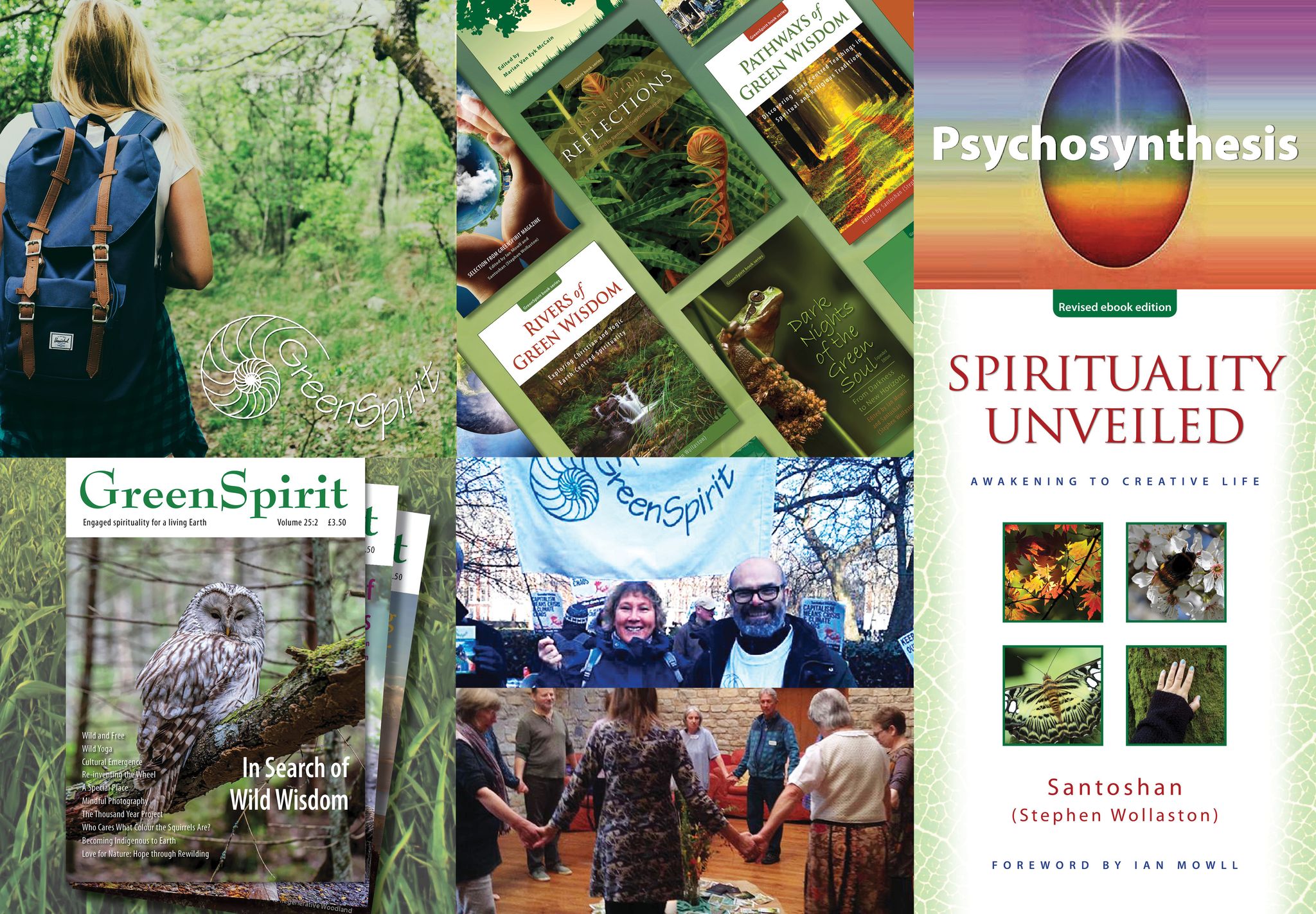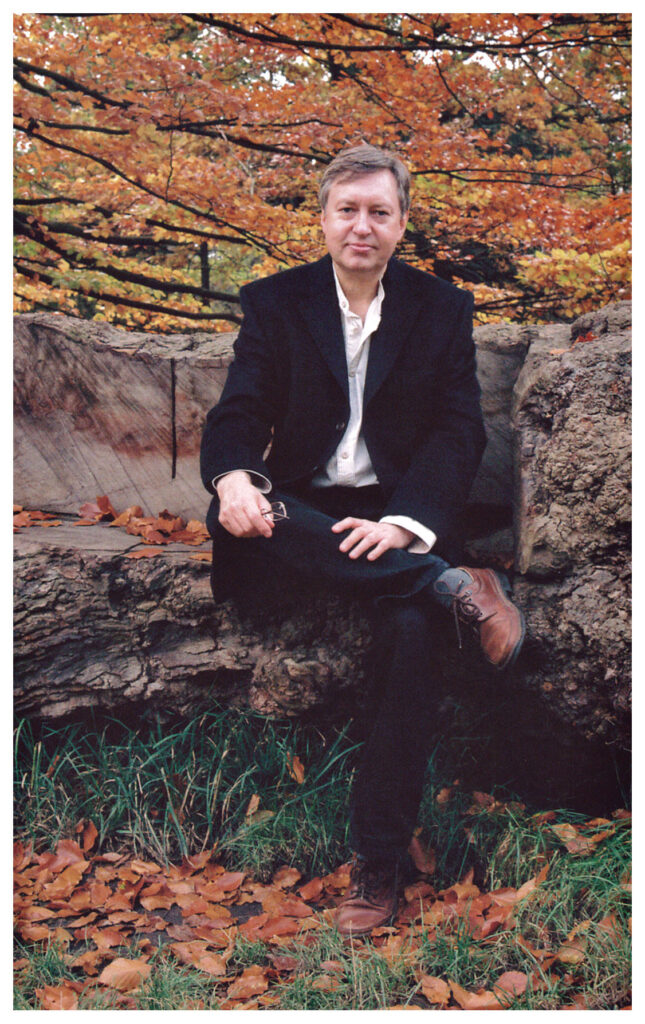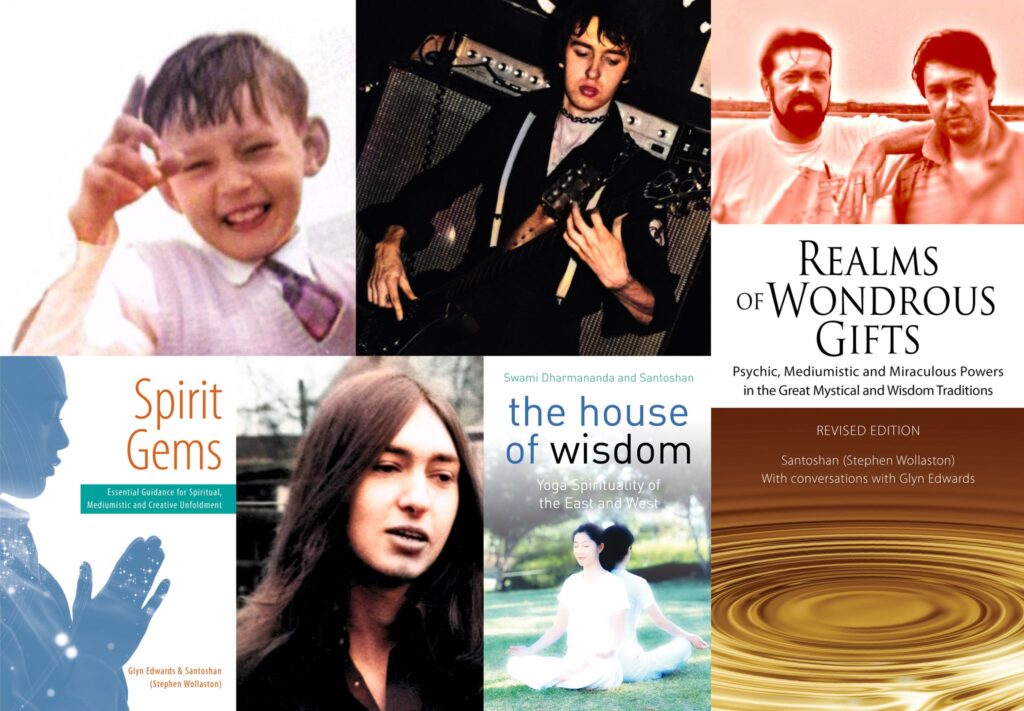
JULIA LEE BARCLAY-MORTON – YOGA, WATER AND REWRITING AUTISM
I interviewed writer Julia Lee Barclay-Morton about her experience of autism. Julia began as an experimental dramatist in New York, moving to the UK to


In the second part of my interview with OneSpirit Interfaith Foundation minister Stephen Wollaston, aka Santoshan, we talked about psychosynthesis, GreenSpiirit and eco-justice.
Stephen is the current chair of GreenSpirit’s Publications Committee and has coauthored and edited more than a dozen books on different areas of Eastern and Western spirituality.
Leslie: What is psychosynthesis and what is it about you that it appeals to?
Stephen: Psychosynthesis is a transpersonal school of psychology, founded by the Italian Jewish psychologist Roberto Assagioli, who was a contemporary of Freud and Jung. It stresses the importance of wholeness and is particularly known for what is called the ‘egg diagram’ that shows three levels of the individual unconscious self – lower, middle and higher – with the Higher Self and the collective unconscious self connecting with them.
Around the middle self is where most people are aware, and through various exercises and interactive relational counselling work, we can expand our awareness to become aware of wider areas of our being, including not only the lower unconscious realm of our shadow self that houses experiences and feelings of shame, fear, pain, despair and anger associated with primal wounding experienced in life, but also higher potential that seeks to express itself and be integrated, which can assist in the healing process towards wholeness. I should point out here that not all forms of anger would be seen as something that needs changing within us, such as anger about wars, prejudice or deliberate environmental damage for selfish profits. Anger in these cases may be the very thing that spurs us into action for bringing about healthy and compassionate changes in the world.
The middle and lower unconscious self is often the starting point for psychosynthesis work. There are of course other key areas that could be mentioned, such as psychosynthesis’s views and exercises about subpersonalities, which are about acknowledgment of and working with various everyday patterns of our life and noticing how they influence ways we act in different situations. But I don’t want to turn this into a psychosynthesis essay, as it would take too long to summarise what is an immensely rich therapeutic transpersonal school of psychology and practice that has a deeply spiritual element to it.
What appeals to me about psychosynthesis, and why I came back to it after doing some courses on it in the late 90s and recently qualifying as a psychosynthesis counsellor, is that Assagioli himself had an interest in theosophy and various psychological and spiritual traditions. Much of the theory behind psychosynthesis has strong comparisons with Yoga psychology and Sri Aurobindo’s Integral Yoga – another teacher whose wisdom I feel deeply drawn to. Plus, psychosynthesis places a lot of emphasis on the use of creativity, which connects with my background and current understanding of spirituality – particularly creation-centred spirituality and Tantra Yoga, the latter of which influenced some of Aurobindo’s teachings, and doesn’t deny the physical world or promote it as an illusion. It instead affirms physical life and the beauty of the natural world and values its strong healing influence. It will however look at restrictive narratives clients may hold that are in need of transformation. Creative exercises might involve working with imagery, dreams, free-drawing, and include art, music and/or poetry and writing a client may have produced.
Leslie: How would you characterise the UK charity GreenSpirit? What’s the history of the movement?
Stephen: This is another big topic that could be a lecture on its own. A fellow GreenSpirit member and trustee Chris Holmes, recently wrote a detailed article for GreenSpirit Magazine about the charity’s history, from which I will summarise some sections here, as well as some passages from my book ‘Spirituality Unveiled: Awakening to Creative life’ (if you wish to know more, see Chris’s article on the GreenSpirit website: www.greenspirit.org.uk).

In 1983 Matthew Fox’s book ‘Original Blessing’ was published and fell on fertile ground. The book’s teachings contrast sharply with mainstream Christian ideas about fall and redemption and instead places strong emphasis on original blessing in place of original sin. The term ‘creation-centred spirituality’ was first suggested as a name for this creative and mystical branch of spirituality in the late 1960s by Fox’s college mentor, the French theologian Pere Chenu. Within the Christian mystical tradition, creation spirituality traces its roots back to early Celtic traditions, the Old and New Testament and the cosmological wisdom of the early Eastern mystics and Medieval Christians such as Hildegard of Bingen, Francis of Assisi, Thomas Aquinas, Meister Eckhart and Julian of Norwich. From non-Christian traditions, it finds common ground with indigenous beliefs and practices, Middle and Far Eastern spiritualities and contemporary science. In Fox’s revival of a creation-centred spirituality, he highlights four essential paths:
1. The Via Positiva: the way of awe, delight and amazement.
2. The Via Negativa: the way of uncertainty, darkness, suffering and letting go.
3. The Via Creativa: the way of birthing, creativity and passion.
4. The Via Transformativa: the way of justice, healing and celebration.
Creation-centred spirituality is not looked upon as a new tradition, but one that has been rediscovered in the West. It affirms diversity and seeks wholeness and unity between male and female, non-binary people, homosexual, bisexual, transsexual and heterosexual differences, as well as different races and cultures, Christians and non-Christians, Earth, the world of Nature, and humans. It has deep connections with the intuitive, creative, caring and compassionate elements of spirituality – qualities of the archetypal anima/feminine or Goddess principle – with liberation theology and justice for the oppressed.
In 1987 the rector of St James’s Church Piccadilly in London, Donald Reeves, invited Matthew Fox to give a number of talks, which had a huge impact that inspired not only those already familiar with Fox’s book but also others. The idea of an experiential mystical element to the teachings made it immensely appealing and was something many progressive Christians had been seeking.
GreenSpirit itself has much to thank Donald Reeves and St James’s Church for. They provided a home for Creation Spirituality, and in 1989 the journal Interchange came into being. In early 1995 the Association for Creation Spirituality was also formed as a charity. At its 1997 annual general meeting, ‘GreenSpirit’ was then proposed as the new name, while the Association for Creation Spirituality was kept as the legal name of the charity. The change of the name was consciously done to expand the reach of the charity and highlight how it was more than a progressive Christian movement and embraced a multiple of beliefs and practices, including those with no direct connections with Chistian theology and practices.
A popular summary of GreenSpirit that I like – although no one remembers who originally said it – is, ‘The radical vision of GreenSpirit brings together the rigor of science, the creativity of artistic expression, the passion of social action and the core wisdom that exists within the spiritual traditions of all ages.’
Leslie: In practical terms, how does GreenSpirit back up/support the protest movements who take actions to end fossil fuels, ecocide and climate breakdown?
Stephen: Because of charity status and, obviously, because of its name, GreenSpirit is primarily about promoting green education and green spirituality. It would not be accepted as a recognised charity in the UK if it held a specific political agenda. However, the GreenSpirit eNewsletter may share links about protest marches being organised, or include an article about climate action in its magazine.
Eco-justice is very much at the heart of most GreenSpirit members’ lives. Members follow their passions, hold their own political beliefs and may become deeply involved in political campaigns or go on protest marches individually or as a GreenSpirit group to promote education around climate change. Some activists come to GreenSpirit to find a community where they find peace, healing and connection with others of like minds, such as when we celebrate the Celtic Seasons, have walking breaks, Wild Week, or our weekend AGM gathering.
I myself look upon GreenSpirit as a community of similar minded people with whom I can safely share my deepest thoughts, feelings and concerns about life, spirituality and the planet. What also attracts me to the work I do for GreenSpirit, is it gives me a platform to share my creative skills as a typographic designer, writer and editor for a cause I’m deeply passionate about. Not only is green spirituality something close to my heart, and makes the most sense to me for this period of Earth’s history, I also love that diversity is seen as a real strength in GreenSpirit wisdom. It’s also wonderful how members of the publications team that I’m part of work so well together and truly appreciate each other’s skills and backgrounds – sadly something I’ve not always found in other spiritual communities. I personally look upon the work as a form of sacred activism, which in some ways may be similar to how justice-seeking movements in the past looked upon their work when they put on talks, produced articles and designed and circulated posters, leaflets and other material for causes they strongly believed in.
My spiritual journey has helped me to see how creativity is written into the Universe, into Nature, into the ways they are continually unfolding, how all life is interrelated, and by creating with wholesome intentions we become co-creators with the creative powers of the Cosmos and the Divine. Since seeing spirituality this way, I’ve realised that we are all parts of one family from one original creative sacred divine source and share an individual and collective responsibility for all life, including the welfare of Mother Earth of which we are all wondrous parts.
Next week I interview artist and poet Becky Nuttall
ABOUT LESLIE TATE’S BOOKS:

I interviewed writer Julia Lee Barclay-Morton about her experience of autism. Julia began as an experimental dramatist in New York, moving to the UK to

I interviewed Gillean McDougall from Glasgow, who edited the collaborative projects Honest Error (on Charles Rennie Mackintosh and his wife Margaret Macdonald) and Writing the

I interviewed French writer Delphine de Vigan, whose book, No et moi, won the prestigious Prix des libraires. Other books of hers have won a clutch

I interviewed Joanne Limburg whose poetry collection Feminismo was shortlisted for the Forward Prize for Best First Collection; another collection, Paraphernalia, was a Poetry Book Society Recommendation. Joanne

I interviewed Katherine Magnoli about The Adventures of KatGirl, her book about a wheelchair heroine, and Katherine’s journey from low self-esteem into authorial/radio success and
| Cookie | Duration | Description |
|---|---|---|
| cookielawinfo-checkbox-analytics | 11 months | This cookie is set by GDPR Cookie Consent plugin. The cookie is used to store the user consent for the cookies in the category "Analytics". |
| cookielawinfo-checkbox-functional | 11 months | The cookie is set by GDPR cookie consent to record the user consent for the cookies in the category "Functional". |
| cookielawinfo-checkbox-necessary | 11 months | This cookie is set by GDPR Cookie Consent plugin. The cookies is used to store the user consent for the cookies in the category "Necessary". |
| cookielawinfo-checkbox-others | 11 months | This cookie is set by GDPR Cookie Consent plugin. The cookie is used to store the user consent for the cookies in the category "Other. |
| cookielawinfo-checkbox-performance | 11 months | This cookie is set by GDPR Cookie Consent plugin. The cookie is used to store the user consent for the cookies in the category "Performance". |
| viewed_cookie_policy | 11 months | The cookie is set by the GDPR Cookie Consent plugin and is used to store whether or not user has consented to the use of cookies. It does not store any personal data. |
2 responses
This is great please
🙂 🙂 🙂